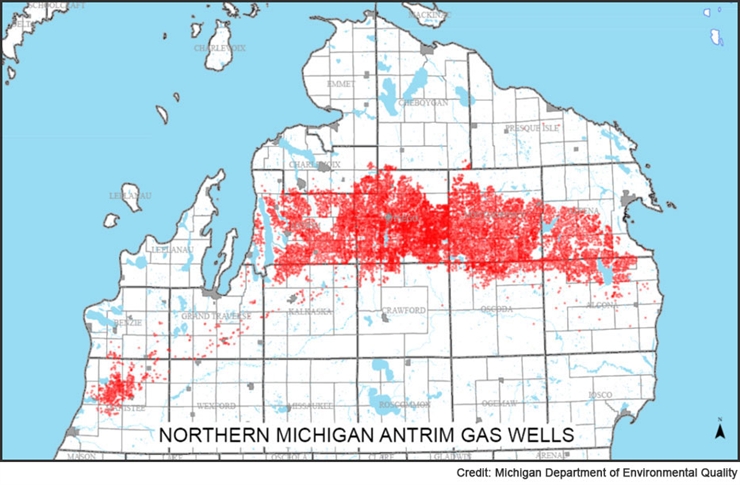By ERIC FREEDMAN
Capital News Service
LANSING – An Alcona County man waited too long to sue an energy company that may have drilled a natural gas well too close to his property line, a federal judge has ruled.
Much too long.
U.S. District Judge Thomas Ludington said Richard Brilinski missed the deadline by waiting about 15 years to start the litigation.

Northern Michigan Antrim gas wells. Credit: Department of Environmental Quality.
“Brilinski’s delay in bringing his claim is inexcusable,” Ludington said in his ruling.
Brilinski’s lawyer, Corey Wiggins of Cadillac, said he doesn’t know yet whether there will be an appeal.
Brilinski controls a trust that owns 80 acres in Caledonia Township, according to the decision. Under the property lies a deposit of natural gas, part of the Antrim Shale formation.
In 1998, a representative of Jet Exploration approached Brilinski and some neighbors seeking to lease their mineral rights for drilling. The neighbors accepted the deal, but Brilinski didn’t because Jet wouldn’t meet his asking price for a higher royalty rate.
Jet then drilled 21 natural gas wells on other property in what became the Timm Antrim Unit, including three on property adjoining Brilinski’s.
Although he suspected that those three wells were less than the state-mandated minimum 330 feet from his property line, Brilinski didn’t complain to the Department of Environmental Quality (DEQ) or to Jet, nor did he take any action other than contact his state legislators until 2012, according to legal papers.
That’s when the DEQ notified him that one of the three wells didn’t comply with the setback requirement.
According to the defendants’ legal papers, “Brilinski explained that he simply
‘wasn’t going to make it a priority’ since he ‘was a busy person.’”
By 2013, Jet was defunct, so Brilinski sued its successor, PDC Energy Inc., and the company operating the wells, Merit Energy Co., for damages. The suit accused them of illegally draining natural gas from below his land.
Wiggins, who represents Brilinski, estimated the value of the natural gas drained from beneath the property at about $500,000, including interest and penalties. The defendants counter that the amount was “negligible.”
PDC and Merit asked the judge to throw out the case without trial, calling the decade-and-a-half delay “excessive and unwarranted.”
In court papers, they argued, “This lawsuit represents his attempt to rectify his poor but informed decision to not join the unit 15 years ago by making claims to retroactively include his land into the unit, avoiding the risk all other owners took, avoiding the costs of exploration and drilling the other owners invested, and taking it all in one lump windfall.”
Ludington agreed, ruling that the litigation clock had run out in 2001 because Brilinski was aware of his possible claims in 1998 and because the law sets a three-year limit for such claims.
“While he is not a royalty owner, he was just as informed about the status of his land and surrounding drilling unit,” Ludington said. “He could see all of the wells constructed around the property and was immediately concerned about whether they were drilled within the legally mandated setback.”
Ludington added, “It should also not be forgotten that Brilinski had the opportunity to join the unit when he could not extract an increased royalty fee,” but chose not to take that opportunity.
Attorney Stanley Stek of Grand Rapids, representing PDC and Merit, said his clients’ policy is not to comment on the substance of ongoing litigation.